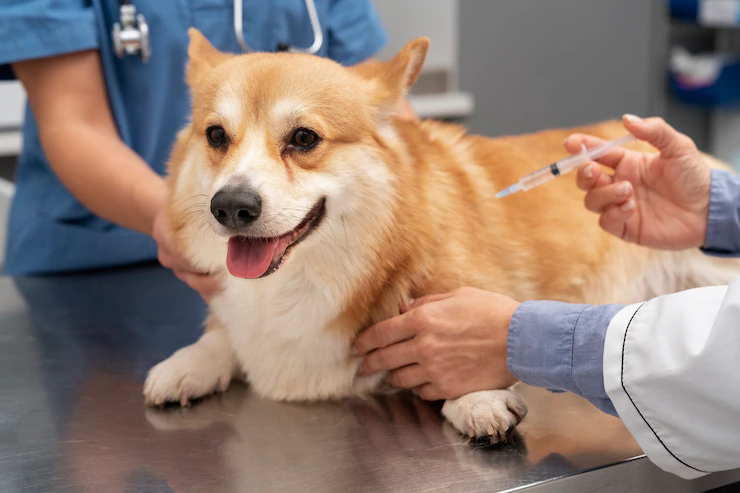Keeping your dog healthy and well-protected is a priority for every pet owner, and vaccinations play a vital role in ensuring their safety. Vaccines safeguard your furry companions from serious diseases, some of which can be fatal or even transmissible to humans. But how do dog vaccinations work? When should you start? And which vaccines are absolutely essential? This guide breaks down everything you need to know.
Why Are Dog Vaccinations Important?
Vaccination is your dog’s first line of defense against a range of harmful diseases. When administered, vaccines prepare the immune system to recognize and fight specific pathogens, reducing the risk of severe illness.
Here’s why vaccinating your dog is crucial:
- Disease Prevention: Vaccines prevent serious conditions like rabies, distemper, and parvovirus, keeping your pet healthy and safe.
- Public Health Protection: Certain diseases, like rabies, can spread from dogs to humans. Vaccinating your dog helps protect your entire household.
- Cost-Effective Care: Treating a preventable disease can be costly and emotionally exhausting. Vaccinations are a small investment compared to potential medical bills later.
- Community Safety: Vaccinating your dog ensures you’re contributing to broader herd immunity, minimizing outbreaks in your neighborhood.
Vaccines not only protect your pet but also provide peace of mind for you as a responsible owner.
Core vs. Non-Core Vaccinations
Vaccines are generally categorized into two groups:
- Core Vaccines: These are essential for all dogs, regardless of their breed, lifestyle, or location. They protect against widespread and potentially deadly diseases.
- Non-Core Vaccines: These are optional and depend on your dog’s specific risk factors, such as lifestyle, geographic location, and potential exposure to certain pathogens.
Core Vaccines
Core vaccines are considered must-haves for all dogs. These include:
- Rabies: Rabies is a fatal disease that affects the nervous system. Most regions require rabies vaccinations by law due to its public health implications.
- Canine Distemper: A highly contagious and often fatal disease that affects the respiratory, gastrointestinal, and nervous systems.
- Parvovirus: A virus that leads to severe vomiting, diarrhea, and dehydration, commonly fatal if untreated.
- Adenovirus (Canine Hepatitis): Protects against infectious canine hepatitis, which can damage the liver, kidneys, and eyes.
Non-Core Vaccines
Non-core vaccines are administered based on your dog’s lifestyle and environment. Common non-core vaccines include:
- Bordetella Bronchiseptica: Protects against a bacterial infection implicated in kennel cough, especially important for dogs that stay in boarding facilities.
- Leptospirosis: Helps prevent a bacterial infection that can cause kidney and liver damage, particularly in dogs who spend time in bodies of water.
- Lyme Disease: Recommended for dogs exposed to ticks in endemic areas.
- Canine Influenza: Offers protection from respiratory illness, particularly for social dogs in high-contact environments like doggy daycares or training schools.
Your trusted veterinarian will help determine which non-core vaccines are necessary based on your dog’s profile.
Puppy Vaccination Schedule
Starting early is key to ensuring your puppy builds strong immunity. Puppies typically receive a series of vaccinations starting at six to eight weeks of age. The schedule should look something like this:
- 6-8 Weeks: First dose of core vaccines (distemper, parvovirus, adenovirus); your vet may recommend the bordetella vaccine if your puppy will be around other dogs.
- 10-12 Weeks: Booster doses of the core vaccines; optional vaccines such as leptospirosis or Lyme disease are administered if applicable.
- 14-16 Weeks: Final booster for core vaccines; rabies vaccine (required by law in most places).
After completing their initial set of shots, your puppy will only need annual boosters for most vaccines.
Adult Dog Vaccination Schedule
For adult dogs, stay up-to-date with these vaccinations:
- Core Vaccines like rabies and distemper typically require booster shots every 1-3 years, depending on the vaccine’s specific duration and your region’s laws.
- Non-Core Vaccines such as leptospirosis or Lyme disease may require annual boosters for ongoing protection, especially if your dog is at high risk for exposure.
Maintaining a consistent schedule is crucial to keeping your dog healthy. Speak with your vet about reminders and documentation for yearly vaccination check-ups.
Potential Side Effects of Vaccinations
While dog vaccinations are overwhelmingly safe, mild side effects may occasionally occur, including:
- Mild fever
- Swelling or soreness at the injection site
- Temporary lethargy
- Loss of appetite
Serious side effects, such as allergic reactions, are exceedingly rare but may include difficulty breathing, vomiting, or facial swelling. If you notice any severe symptoms, contact your vet immediately.
Addressing Vaccine Myths
There’s a lot of misinformation about dog vaccinations. Here’s the truth behind some common myths:
- Myth: Indoor dogs don’t need vaccinations.
- Truth: Even dogs that rarely go outside can be exposed to contagious diseases through contact with other pets, surfaces, or humans carrying pathogens.
- Myth: Vaccinations can make dogs sick.
- Truth: Mild side effects are normal as your dog’s immune system responds to the vaccine. These effects are minimal compared to the risk posed by actual diseases.
- Myth: Once vaccinated, my dog is protected for life.
- Truth: Immunity wanes over time, so regular booster shots are essential.
Trusted guidance from your veterinarian can help address concerns and ensure your dog gets the right vaccinations at the right time.
The Role You Play in Keeping Your Dog Healthy
Vaccination is a team effort, requiring collaboration between you, your vet, and your community. Here’s how you can contribute:
- Follow your vet’s vaccination schedule and attend all recommended booster appointments.
- Keep a record of your dog’s vaccination history for travel, boarding, or legal requirements.
- Regularly consult your vet to discuss potential lifestyle or environmental changes that may affect vaccination needs.
Protect Your Best Friend Today
Dog vaccinations are an essential part of responsible pet care. They provide protection against life-threatening diseases, improve your dog’s quality of life, and promote a safer environment for all.
Curious about your dog’s specific vaccination needs? Book a visit with your veterinarian to create a customized vaccination plan tailored to your pup’s lifestyle and health.





























